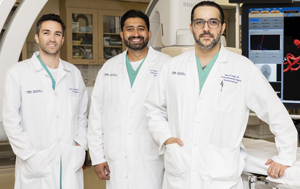A corporate chef for more than 30 years, Karla Grimaldi, 57, of Ossining, learned five years ago – quite by accident, while trying to diagnose a case of vertigo and headaches – that she had a large brain aneurysm.
She underwent a coiling procedure at a New York City hospital through the traditional, femoral approach. The conventional approach to treating aneurysms, the procedure involves the placement of a catheter through a patient's groin and navigation to reach the brain. The procedure removed the majority of the aneurysm, and allowed Karla to return to her life and work.
Five years later, Karla learned that the aneurysm had recurred and grown by more than 20 percent and a second procedure would be necessary. This time, she was referred to Fawaz Al-Mufti, MD, neuroendovascular surgeon at Westchester Medical Center, the flagship of the Westchester Medical Center Health Network (WMCHealth).

Remembering the discomfort caused by the first, groin-access procedure, Karla was pleased to learn that Dr. Al-Mufti and the team at Westchester Medical Center are the only neuroendovascular surgeons in Westchester County and the mid-Hudson Valley region capable of routinely performing the cerebrovascular interventions through the wrist, via a trans-radial approach. This access point affords the patient greater dignity, reduces the risk of complications, and provides a higher level of comfort, with the patient able to move around almost immediately following the procedure.
"There is a growing body of literature supporting the adoption of trans-radial artery access for neuro-interventions since it is safe and associated lower infection rates, less pain and greatly improved patient comfort, as well as improved outcomes and healthcare quality," said Dr. Al-Mufti.
Trans-radial access also allows for a shorter recovery period than trans-femoral access procedures, which require a patient to lie flat for three to six hours.
"Laying flat for prolonged periods may be an issue for many of our patients who suffer from back pain, respiratory issues or heart problems," said Chirag Gandhi, MD, Acting Director of Neurosurgery at Westchester Medical Center. "With the trans-radial approach, patients can be walking around in 30 minutes and go home soon afterwards."
In early October, Dr. Al-Mufti performed the stent-assisted coil embolization procedure on Karla, threading a catheter through a small puncture above Karla's wrist. Using fluoroscopic guidance, he navigated into the vessels of her head and neck and performed the embolization procedure on the vessels of her brain. Requiring the expertise of a specially trained surgeon, the procedure takes between 30 minutes and two hours, and allows the patient to move almost immediately. Within two days, Karla was back home, and within two weeks, she was back in the gym for her boot camp class!
"It's amazing that Dr. Al-Mufti could just make this small pin hole in my wrist and through that, fix the aneurysm in my brain," Karla said. "Having been through both the traditional procedure and the radial approach, the comfort level was such a difference for me. I knew I could be confident in Dr. Al-Mufti and his team from the moment I met him."
Westchester Medical Center's Brain and Spine Institute treats patients in all areas of neurosurgical need, including spine surgery, neuro-oncology (brain, spine and spinal cord tumors), skull-base surgery, cerebrovascular services (stroke and aneurysms), functional neurosurgery (pain, Parkinson's, Epilepsy) peripheral nerve surgery, neurotrauma and neurosurgical critical care.
To make an appointment with Dr. Al-Mufti or another Brain and Spine Institute specialist, call 914.493.2363 or visit www.westchestermedicalcenter.org/brain-and-spine-institute.